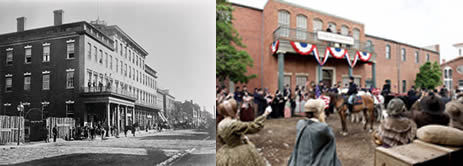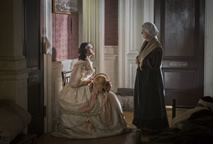 "Your dress is abominable, most abominable.... I do not wish my nurses to dress in that manner. These boys must be looking to their recuperation, not at the hem of your skirts."
"Your dress is abominable, most abominable.... I do not wish my nurses to dress in that manner. These boys must be looking to their recuperation, not at the hem of your skirts."
Episode One (airing January 17) of the PBS six-part series Mercy Street opens with Superintendent of Army Nursing Dorothea Dix dismissing a young applicant whose attire and coiffure are far too frilly and feminine.
The next applicant is the female lead in the depiction of the ego-political-societal "wars" that rage in a Union Army hospital in Union-occupied Alexandria, Virginia, in 1862. Ms. Dix delivers a no-nonsense appraisal and edict that seem wholly in keeping with what history tells us about her uncompromising and upsetting ways.
"I see that you are in mourning. Well, the frock suits you.... In time of pain and chaos, we are instruments of mercy and order. That and only that is what we offer the boys."
Sternly chastened to forget about her abolitionist politics, Ms. Dix does compliment the young lady in the mourning frock on being "sufficiently plain, so as not to distract." Dix then preps her as to the battles she is likely to encounter when she enters the nursing fray.
"You are my emissary, no matter what anyone else tells you. Army doctors do not like women, or nurses, or me. If you are not welcome, I am not welcome. And I do not like to be unwelcome."
On her arrival at the Mansion House Hospital, the new nurse (Nurse Mary) hears a man hawking a wooden leg. Dumped from a third-floor window is a bloody bundle. As it thuds into a waiting wheelbarrow, the bloody sheet spreads open to reveal an assortment of amputated limbs.
Inside what had been one of the finest hotels on the East Coast (for "the secessionist upper crust"), the chaos seems to convey what Louisa May Alcott described as the "Hurly-burly House" in Hospital Sketches, her 1863 chronicle of her stint as a Civil War nurse.
No Clara Barton -- yet Louisa May Alcott did address patients' needs and indignities.
Architecture and set-design
Archival photos of the actual Mansion House Hospital in Alexandria, Virginia, served to inform the recreations: A façade and adjacent structures were constructed in Petersburg, Virginia for street scenes. The Laburnum House in Richmond served for the interior scenes. 
Medical matters
•"Gangrene has set in. The smell is the least of it." Can the limb be saved, or must it be eliminated to save the rest of the body?
•a blood vessel was ruptured when a bullet was removed; cauterized over, it has become infected; there's hemorrhaging; without a ligature, the soldier will bleed to death. Who will perform the procedure?

 •shortness of breath, cardiac palpitations, sweating, chest pains, mental distraction are diagnosed as "precipitated by battle trauma" and labeled "soldier's heart." The patient murmurs, "There's no medicine for what ails me. They don't understand what's in my head." But is there an 1862 remedy for what we now refer to as Post-Traumatic Stress Disorder?
•shortness of breath, cardiac palpitations, sweating, chest pains, mental distraction are diagnosed as "precipitated by battle trauma" and labeled "soldier's heart." The patient murmurs, "There's no medicine for what ails me. They don't understand what's in my head." But is there an 1862 remedy for what we now refer to as Post-Traumatic Stress Disorder?
Several of my favorite characters had only a few scenes and a few lines.
 To an innocent hoop-skirted Southern Belle who thought she might comfort her young men (segregated in the Union hospital), Matron Brannan explains, "Military hospitals and crinolines don't mix, dearie." Matron studies the ribbon-and-lace belle for a moment, and then, in her Irish brogue, wryly adds, "You're just what they need."
To an innocent hoop-skirted Southern Belle who thought she might comfort her young men (segregated in the Union hospital), Matron Brannan explains, "Military hospitals and crinolines don't mix, dearie." Matron studies the ribbon-and-lace belle for a moment, and then, in her Irish brogue, wryly adds, "You're just what they need."
The administrative chief of the hospital, the pragmatic Dr. Summers, greeted Nurse Mary dismissively: "You have no idea what you're signing up for, do you?"
War wounds - an unparalleled opportunity
In Episode Two, following an experimental and extraordinarily risky procedure (a trephination) to deal with neurological deficit from a skull wound, Dr. Summers tries to convince the brilliant civilian contract surgeon to stay on past his contract term. The rival surgeon had diagnosed the head-wound patient as a cowardly malingerer, rather than a sufferer of expressive aphasia. In one of the many ego-and-turf battles, the rival surgeon cites the civilian surgeon for "flouting procedure by engaging in unauthorized and inappropriate procedures."
Sagely, Dr. Summers admonishes the civilian surgeon:
"Naughty, naughty, surgeon. You have not been playing well with some of your commissioned colleagues."
In an effort to convince the civilian surgeon to stay on, Dr. Summers calms the air by extolling the workplace and its perks:
"An uncivilized environment, hopeless wounds, incompetent support, an excess of work, paltry compensation - we offer every enticement."
"But there's an unparalleled medical opportunity."
Though tempted by that lure, the civilian contract surgeon explains the obvious: He bristles at the restrictions, the hierarchy, the regulations.
"Good!" exclaims Summers. "I'm sick of parrots and lemmings. And so is the Surgeon General."
Trial - baptism - by scalpel and surgical saw
Severing vessels, and family ties
In Episode Three, Dr. Foster - formerly the civilian contract surgeon, now the newly-minted Army surgeon - has about six minutes of clinical anatomy (about 28 minutes into the episode) that is not for the faint of heart, eye, and stomach. Unless, of course, the viewer is intent on prepping for the Medical College Admission Test (the MCAT).
Here's a cryptic preview of mother-son son-brother tensions provoked by a musket ball that was crudely extracted on the battlefield:
"The leg is staying where God put it."
"But there's a real risk of pyaemia, blood-poisoning. Most men die from that."
"You'll keep him whole."
As other characters (and there are many other characters) plot and scheme, intrigue and subvert, and struggle with their allegiances, loyalties and enmities, Dr. Foster begins a life-or-death procedure, by the book - literally, by the book.
"Dissect interosseous membrane.... Commence incision with the heel of the knife.... The skin is raised from the first layer of muscles by dissection and is drawn upwards like the cuff of a coat.... The first layer of muscles is divided at the margin of the retracted integument.... Once the artery is severed it must be ligated with silk prior to the amputation of the lower extremity...."
Amid the singing of a spiritual in another part of the hospital, we hear the sound of sawing.
"Hold his leg so that it won't splinter."
For Dr. Foster, who has been perspiring and respiring heavily, the end is figuratively in sight - with the severed leg then most vividly in sight:
"You can put it down."
Another perilous procedure
In Episode Four, Dr. Foster is asked if an experimental procedure he is recommending was successful. His reply: "Not for the patient."
"She's distended. Blood is accumulating in her abdomen. She's perforated the uterine wall. She's cut an artery.... abdominal incision to gain sub-perimetrium access to the uterus from which we could repair the perforation."
And there is still more to engage those studying for the MCATs.
"There's a laceration of the artery in the uterine wall.... You'll need to dissect the muscle.... Take care not to injure the vessels.... Now push the bladder downward, gently.... There it is, the uterine wall. Do you see the perforated artery? You'll need a ligature.... Silk sutures and a tenaculum.... Careful, so much as a pinprick and she dies of peritonitis."
How much mercy in the Mercy Street hospital
In Episode Five, our suppositions are confirmed: "The route they use to bring the wounded men up from the barges, I've heard them call it Mercy Street because it leads them here, where they might be saved."
Women in wartime
In Episode Six, Superintendent of Army Nursing Dorothea Dix makes another brief - but poignant - appearance. She informs Nurse Mary that
"Our mission grows. The war will not end soon."
Nurse Mary admits that "it has not been as I expected."
Superintendent Dix replies, "It never is." Then the Superintendent observes, "We need places of healing and mercy now more than ever."
She asks Nurse Mary to resolve to be resolved: "You must fight through it - through the hardship, the resistance, the futility." 
As if she were a Dorothea Dix confederate (lower case c, here), the matriarch of the once-commercially-formidable family whose hotel has been turned into the Mercy Street hospital (and whose home is now increasingly occupied by Union officers) advises her daughter:
"Men are allowed to fall prey to their emotions, we women must be stronger than that."
Drama, rather than documentary
My extractions do not convey the range of rivalries and intrigues involving doctors and nurses; nor the tensions involving "contraband laborers" nor those between Union stalwarts and Confederate loyalists. Mercy Street is most assuredly "multi-layered," revealing "the stories of those struggling to save lives while managing their own hardships."
Even though inspired by memoirs and letters from real doctors and nurse volunteers at Mansion House Hospital, I wondered why PBS went the route of drama (even melodrama).
I wondered why PBS, which has been so highly and so deservedly "decorated" for its extraordinarily rich and educating documentaries, chose to produce "the first American drama to air on PBS in more than a decade."
"We felt this was the right time and the right project to invest in," says Beth Hoppe, who is Public Broadcasting's Chief Programming Executive and General Manager (General Audience). "With PBS' reputation and commitment to great storytelling, and with the broad reach typical of drama series, Mercy Street is a way to reach new audiences with a compelling mix of entertainment, education and history. We believe the series captures the overall feel of the Civil War-era and combines it with the human interest drama that you would expect to find in a hospital unit in an occupied city."
"Don't let the fact that it's on PBS fool you," declares Amelia Grabowski, the Outreach and Education Specialist at the National Museum of Civil War Medicine:
"At the end of the day, Mercy Street is a fictional television show--and that's a good thing. Mercy Street does not claim to be the be-all-end-all of factual representation of the Civil War. Instead, it's doing what the factual representations cannot. It's playing with the past, creating drama, intrigue, and intimate moments, and in doing so prompts you to think and reflect on the topic in a new way. And I for one, find that really exciting."
For those who hanker for documentation, via the PBS Web site, there are "Behind the Lens" essays from Dr. Stanley B. Burns, the photograph collector, archivist, curator, and historian who served as the medical, historical and technical advisor for the series.
The Civil War For me, Ken Burns's The Civil War lingers as a triumph of narrative and pictorial documentation and evocation. That 9-part series, I gather, is still "the highest-rated and most celebrated documentary in public television's history." It was acclaimed with a Peabody Award, and was celebrated by the Television Critics Association as "The Program of the Year."
For me, Ken Burns's The Civil War lingers as a triumph of narrative and pictorial documentation and evocation. That 9-part series, I gather, is still "the highest-rated and most celebrated documentary in public television's history." It was acclaimed with a Peabody Award, and was celebrated by the Television Critics Association as "The Program of the Year."
 Told in the actual words of actual soldiers and family members, via poignant excerpts from their diaries and letters, and most telling amalgams of vintage photographs and illustrations, Ken Burns's nine-part feat was laureled with the Primetime Emmy Award as the Outstanding Information series; and episode 9 ("The Better Angels of Our Nature") was celebrated as the Outstanding Individual Informational Program.
Told in the actual words of actual soldiers and family members, via poignant excerpts from their diaries and letters, and most telling amalgams of vintage photographs and illustrations, Ken Burns's nine-part feat was laureled with the Primetime Emmy Award as the Outstanding Information series; and episode 9 ("The Better Angels of Our Nature") was celebrated as the Outstanding Individual Informational Program.
However,
If you liked E. L. Doctorow's Ragtime, and its stage and cinematic adaptations, you will like Mercy Street.
If you liked Gone with the Wind, you will like Mercy Street.
